Products Liability
Honda and Ford Recall More than 2 Million Vehicles
 Two major manufacturers have issued car recalls impacting more than three million drivers.
Two major manufacturers have issued car recalls impacting more than three million drivers.
Ford last week announced the recall of more than 1.22 million pickup trucks because of a corrosion problem that can result in a gas tank falling off and catching on fire. The recalled trucks include the popular F-150.
The Ford recall affects older trucks sold between 1997 and 2004 in Canada, Washington D.C. and 21 cold-weather states where salt is used on the roads to prevent icing in the winter. Massachusetts is among those states.
The Michigan car manufacturer plans to notify affected owners in September and will repair the trucks for free. The models include: Ford F-150 (1997-2003), the 2004 F-150 Heritage, the F-250 (1997-1999) and the Lincoln Blackwood (2002-2003).
Ford said it has received eight reports of tanks falling, resulting in three injuries.
This is the second recall action involving Ford trucks in four months. In April, Ford expanded a recall of F-150 pickups to about 1.2 million trucks. In that case, the problem was the front-seat airbags could deploy without a motor vehicle crash.
Also last week, Honda Motor Co. announced the recall of more than 2.49 million cars, SUVs and minivans with defective transmission software. The defect can affect a car’s transmission if the software cannot keep up with movements, such as a vehicle trying to emerge from the snow or a driver moving between gears.
The Honda recall includes 1.5 million vehicles in the U.S., about 760,000 in China and 135,000 in Canada.
Globally, the recall affects four-cylinder Accord sedans (2005 – 2010). In the U.S. and Canada, the car recall also includes the CR-V crossover (2007 to 2010) and the small Element SUV from (2005 to 2008).
The company said no injuries or wrongful deaths have been reported due to the defect.
Honda will begin contacting U.S. consumers at the end of August about updating the software. The update will be free.
Read More
FDA Issues Warning About Transvaginal Mesh Surgery
The Food and Drug Administration (FDA) has issued a public notice on transvaginal mesh surgery after receiving thousands of reports about harmful complications. The notice advised patients and healthcare providers to consider alternatives to mesh surgery. The FDA has not issued a product recall, but will convene a panel this fall to make recommendations for the procedure.
Transvaginal mesh is a medical device implanted surgically to treat Pelvic Organ Prolapse (POP) and Stress Urinary Incontinence (SUI). These conditions can emerge after childbirth and pregnancy. POP occurs when organs bulge into the vaginal and bladder areas. SUI is a loss of bladder control.
Over 1,000 adverse events involving transvaginal mesh devices were reported to the FDA between 2005 and 2007. On October 20, 2008, the FDA issued a Public Health Notification reporting the figures. From January 2008 to December 31, 2010, there were an additional 2,874 reports of complications.
From 2006 to 2011, the FDA conducted a systematic review of published scientific literature and reported transvaginal POP repair with mesh has no advantage over traditional non-mesh repair. The FDA is advising health care providers to only choose mesh surgery after carefully comparing the risks and benefits with other surgical options.
The most frequent complications associated with transvaginal mesh surgery is erosion throughout the vagina, pain, infection, bleeding, pain during sexual intercourse, organ perforation and urinary problems. There were also reports of emotional problems, vaginal scarring and neurovascular muscular problems.
Many of these conditions involve painful remedies, including medical treatment, several surgeries and hospitalization.
Several companies manufacture transvaginal mesh, including Johnson & Johnson and Boston Scientific, C.R. Bard, Tyco Covidian and AMS. Injuries have not been linked to a single brand of mesh.
If you have been injured by a transvaginal mesh repair, you may be entitled to compensation. It is important to speak to an experienced product liability lawyer as soon as possible so you can obtain the proper medical attention and compensation for your injuries, loss of time at work and pain and suffering.
For a free legal consultation, contact the experienced Boston product liability lawyers at Breakstone, White & Gluck today. Call us at 800-379-1244 or use our contact form.
Read More
Defective Toy Truck Recalled by Fisher-Price
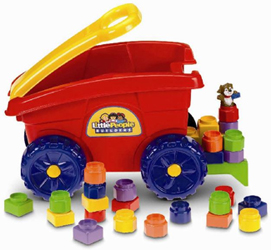 Fisher-Price has recalled a popular toy truck after its plastic handle has been found to pose a laceration risk.
Fisher-Price has recalled a popular toy truck after its plastic handle has been found to pose a laceration risk.
The East Aurora, New York toymaker recalled its Little People® Builders’ Load ‘n Go Wagon in cooperation with the U.S. Consumer Product Safety Commission (CPSC) and Health Canada this week. About 208,000 defective toy trucks were recalled in the United States and 2,800 in Canada. The toy trucks were sold in mass merchandise retail stores nationwide from June 2009 through July 2011 for about $25. They were manufactured in Mexico.
The toy truck is being recalled because its plastic handle has molded-in reinforcement. If a child falls on it, he could suffer a laceration.
The CPSC and Fisher-Price are aware of seven reports of personal injuries. Five reports came from children requiring surgical glue or stitches.
Consumers affected by the Fisher-Price recall can call 800-432-5437 or visit www.service.mattel.com for a free repair kit. The recall involves the wagon with the model number P8977. More information is available on the Mattel website.
Product recalls and deaths related to unsafe toys have declined in recent years, but toy-related injuries have been increasing. In 2009, 186,000 children under 15 were treated for toy-related injuries in emergency rooms, up from 152,000 in 2005.
In 2009, 12 children under 15 suffered wrongful deaths involving defective toys, a 50 percent decrease over the two prior years. Meanwhile, in 2010 there were 44 toy recalls, a significant drop from 172 in 2008.
The CPSC offers a few tips for parents: purchase age-appropriate toys, include safety gear whenever you buy sports equipment and ride-on toys and always be aware of your child’s location during play. Parents should also closely inspect toys prior to giving them to children.
Read More
New Crib Safety Standards Ban Sales of Drop-Sides
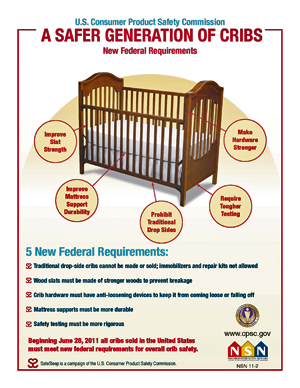 The Consumer Product Safety Commission (CPSC) has implemented comprehensive new safety standards for baby cribs. The standards ban the sale of dangerous drop-side cribs and improve safety testing to prevent infant strangulation deaths.
The Consumer Product Safety Commission (CPSC) has implemented comprehensive new safety standards for baby cribs. The standards ban the sale of dangerous drop-side cribs and improve safety testing to prevent infant strangulation deaths.
The regulations took effect this week after the recall of over 11 million unsafe cribs since 2007. Over the past decade, at least 32 infants have suffered suffocation and strangulation deaths in defective baby cribs.
The CPSC is calling the new regulations the “most stringent crib safety standards in the world.” The standards are important for parents to learn because the CPSC reports that even cribs without drop-sides are unlikely to meet the new standards.
The standards work to prevent infant deaths in several ways. In addition to banning the manufacturing or sale of drop-side cribs, the standards strengthen mattress supports and crib slats, make testing more rigorous and require crib hardware to have anti-loosening devices.
All importers, distributors, manufacturers and retailers must comply with the regulation immediately. Many large retailers such as Target and Walmart say they have already stopped selling drop-side cribs.
Certain businesses using cribs have a grace period for compliance: in-home child care services, child care facilities, rental companies and public accommodations such as hotels.
The CPSC said parents who want to keep using drop-side cribs can contact their manufacturer and ask if they offer an immobilizer. These devices secure drop-sides to prevent the crib from separating and causing an infant injury.
Parents with other types of cribs are urged to check their cribs as well. One of the reasons other cribs are unlikely to comply is the new standards require stronger wood and other materials. Parents who continue to use their existing cribs are urged to monitor recalls on the CPSC website at www.cpsc.gov.
Read More
Product Recall: Bunk Beds from Big Lots
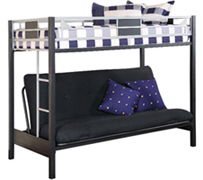 A popular bunk bed set is being recalled after a three-year-old boy became entrapped in the frame and died due to asphyxiation.
A popular bunk bed set is being recalled after a three-year-old boy became entrapped in the frame and died due to asphyxiation.
Big Lots of Columbus, Ohio is recalling 30,000 metal futon bunk beds sold at its stores nationwide from January 2009 through April 2010 for about $200.
The recalled beds have a convertible futon bed on the bottom with a metal ladder leading up to a twin-sized bed. The Consumer Product Safety Commission (CPSC) warns parents that children behind the futon or in the ladder area can become entrapped when the futon and its metal frame are lowered to the flat position.
In March 2010, a young boy from Burlington, Iowa suffered a wrongful death after his head and neck got caught in the bunk bed. The child was unable to breathe and died at the hospital due to compression asphyxiation.
An additional hazard is the space between the last rung on the defective bunk bed’s ladder and the futon mattress is too small, posing a head and neck entrapment hazard.
The Big Lots recall involves metal futon beds with model number BFB1008 located on a label on the upper bunk. The defective beds were sold unassembled and were manufactured in China.
Consumers should immediately stop using the defective bunk beds. They can contact Big Lots for a free repair kit containing a new ladder and other parts.
Consumers can contact Big Lots at (866) 244-5687 during business hours Monday through Friday or visit the retailer’s website at www.biglots.com.
Big Lots has stores throughout Massachusetts, including in Lynn, West Bridgewater, Franklin, Milford, Methuen, Attleboro, Raynham Center, Worcester, Fitchburg, Seekonk, Swansea, Dudley, Gardner, Springfield and Northampton.
Read More
Youth Bicycle Helmets Recalled
 Parents are advised to check their children’s bicycle helmets after a widespread recall involving popular models sold at Walmart and Amazon.com. The recall may affect families and cyclists in Massachusetts.
Parents are advised to check their children’s bicycle helmets after a widespread recall involving popular models sold at Walmart and Amazon.com. The recall may affect families and cyclists in Massachusetts.
Bell Sports of Scotts Valley, California is recalling 33,600 of its Bell Exodus full-face helmets with a plastic buckle on the chinstrap. The defective bike helmets have an angled visor and came in multiple colors in youth size. They were sold at Walmart stores and Amazon.com for $50 to $60 between August 2009 and March 2011.
The helmets pose a head injury hazard in the event of bike accident. The plastic buckle that connects the chin straps can fail and cause the helmet to fall off the person’s head, leaving them unprotected in bicycle accidents. The company has received one report of a buckle failing, resulting in a personal injury that required facial stitches.
Some 31,100 of the defective bike helmets were sold across Massachusetts and the United States. Another 2,500 helmets were sold in Canada.
Consumers are advised to stop using the helmets immediately. Read about the bike helmet recall on the Consumer Reports website. You will find a list of model numbers.
Contact Bell Sports if you have a defective helmet and request a free replacement. Call Bell Sports toll-free at 866-892-6059 between 8 a.m. and 5 p.m. CT Monday through Friday.
If you are a cyclist, wearing a helmet is critical to reducing the risk of head injuries. It is also critical for your children. It is important to purchase a helmet which is safe for use, meets CPSC standards and to learn how to properly fit your helmet. To learn more, read this brochure from the NHTSA – and share it with your friends and family members who ride.
Another important safety tip is to replace your helmet regularly. We hope you never fall or are injured in a bicycle crash, but if you do fall, your helmet should be able to absorb the fall and provide protection. Once a helmet hits the ground in a crash, it should be replaced right away. If you don’t crash, you maybe able to use your helmet for a few years. You have to carefully inspect your helmet, evaluate the condition of the helmet and the wear and tear on helmet straps. Some people should replace helmets every year and others may work for two or three years.
In Massachusetts, cyclists who are 16 and younger are required by law to wear bicycle helmets. Bike share programs in the Boston area typically have language in their rider contracts, requiring cyclists to wear helmets at all times. Wearing a bicycle helmet is a step every cyclist can take to protect themselves, so we hope you and your family take time to purchase helmets and commit to wearing them. Read More
One Million Pool Drain Covers Recalled As Summer Begins
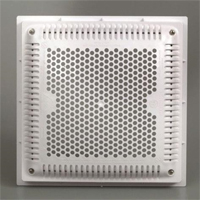 One million defective pool and spa drain covers are being recalled because they are incorrectly rated to handle the flow of water and pose a possible entrapment hazard.
One million defective pool and spa drain covers are being recalled because they are incorrectly rated to handle the flow of water and pose a possible entrapment hazard.
No injuries have been reported. The safety drain covers are being voluntarily recalled by eight manufacturers and are not sold directly to consumers.
There are 6.2 million residential and public inground pools and inground spas in the United States and the pool drain cover recall affects fewer than 5 percent, according to the Consumer Product Safety Commission (CPSC). But the recall comes just a few weeks before schools in Massachusetts finish for the summer and it is unclear how many closures it may force among the state’s public swimming pools.
The federal Virginia Graeme Baker Pool and Spa Safety Act took effect December 19, 2008, tightening safety standards for drain covers sold to consumers and public pool operators. The recalled drain covers were installed after that, between December 19, 2008 and April 2011.
The new legislation has been credited with reducing fatal drownings and pool accidents caused by unsafe suctions. From 1999 to 2008, 12 people were killed in pool and spa entrapments and 72 suffered injuries, according to the CPSC. In 2009 and 2010, there were no deaths and 10 pool entrapment injuries reported.
The affected drain covers were sold through independent distributors to pool and spa builders and installers. The CPSC is advising consumers to contact their pool builder or pool service provider. Consumers can also visit the Drain Cover Recall web page maintained by The Association of Pool & Spa Professionals or call the association at 866-478-3521.
The manufacturers and pool service professionals will replace or retrofit the defective pool drain covers at no charge to consumers.
Consumers are advised not to use pools with the defective drain covers and not to attempt to replace the drain covers themselves.
The manufacturers involved in the pool drain cover recall are A&A Manufacturing of Phoenix, Arizona; AquaStar Pool Products Inc of San Diego; California, Color Match Pool Fittings of Surprise, Arizona; Custom Molded Products of Tyrone, Georgia; Hayward Pool Products of Elizabeth, New Jersey; Pentair Water Pool and Spa of Sanford, North Carolina; Rising Dragon USA, of E. Sweetwater, Tennessee and Waterway Plastics of Oxnard, California.
For more information on the recall, click here.
Read More
One Million Defective Baby Strollers Recalled
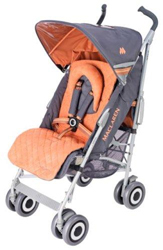 The Consumer Product Safety Commission (CPSC) has reannounced the recall of an unsafe baby stroller that is connected to 149 reported incidents, involving fingertip amputations, lacerations and other personal injuries.
The Consumer Product Safety Commission (CPSC) has reannounced the recall of an unsafe baby stroller that is connected to 149 reported incidents, involving fingertip amputations, lacerations and other personal injuries.
The CPSC reannounced the product recall of Maclaren strollers sold from 1999 to November 2009. The recall was reannounced in cooperation with the distributor, Maclaren USA, Inc., of South Norwalk, Conn.
Approximately one million defective baby strollers were sold nationwide through various retailers, including Babies R Us and Target. The strollers are defective because they have a hinge mechanism that can amputate a child’s fingers or cause a laceration when the consumer opens and unfolds the stroller.
The CPSC advises parents to stop using the defective baby stroller immediately and contact the company for a free repair kit, which includes a fabric cover for the hinge mechanism.
When the product was first recalled in 2009, the CPSC had received reports of 15 incidents, including 12 finger amputations. The CPSC made the reannouncement after the number climbed to 149, including 37 injuries that occurred after the 2009 recall. To date, the Maclaren stroller recall involves 17 overall reports of fingertip amputations as well as other serious personal injuries.
Parents can determine whether they have a defective children’s product by checking to see if the word “Maclaren” is printed on the stroller. If so, they should contact the company.
The affected models are Volo, Triump, Quest Sport, Quest Mod, Techno XT, Techno XLR, Twin Triumph, Twin Techno and Easy Traveler. The recalled strollers are single and double umbrella models.
Models sold after May 2010 have a different hinge design and are not included in the product recall.
Contact our dedicated Boston attorneys today
The Boston Massachusetts product liability lawyers at Breakstone, White & Gluck have over 80 years combined experience handling cases involving serious personal injury. We are experienced in handling injuries resulting from product recalls, defective motor vehicles and unsafe children’s toys and products.
If you have a case, contact us today at 617-723-7676 or use our contact form.
Parents Urged to Stop Using Infant Child Chairs
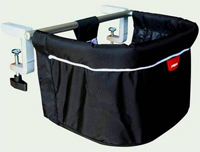 The U.S. Consumer Product Safety Commission (CPSC) is urging parents to stop using a clip-on table top chair for children that poses a threat of detaching and causing serious injuries.
The U.S. Consumer Product Safety Commission (CPSC) is urging parents to stop using a clip-on table top chair for children that poses a threat of detaching and causing serious injuries.
The CPSC reports it is aware of numerous incidents involving the “metoo” chairs imported by phil&teds USA Inc. of Fort Collins, Colorado. Children have suffered impact and head injuries when the chair detaches from the table and causes them to fall with it. Tens of thousands of chairs may have been distributed since May 2006 through Amazon, Buy Buy Baby, Target, Toys R Us and other merchants.
The company has refused to agree to a national product recall that is acceptable to the CPSC. The company has offered a repair kit for the defective products, but it is not approved by the CPSC.
The defective children’s products consist of a nylon fabric seat and a metal frame that clamps to tables using two metal vise clamps. The upper part of each clamp rests on the table top and has either a rubber clamp pad on its underside or a rubber boot covering it.
The CPSC reports the chair’s clamps can detach from a variety of table surfaces and when children move around or push their feet against other objects.
Another CPSC concern is the lack of plastic spacers between the horizontal metal bar and the clamps. If one side of the chair detaches, there is a risk for pinching and cutting children’s fingers or causing possible amputation if fingers are caught between the defective chair and a table.
The CPSC states that the defective products have no product warning about the lack of plastic spacers. Some chair models have the spacers and are under evaluation by the CPSC.
Finally, the CPSC is concerned about misleading product packaging and instructions. The agency said the packaging actually shows the chair being used in a way that may lead to detachment from a table, but there is no instruction warning against this use.
Read More
Salmonella in Alfalfa Sprouts Prompts Recall in Massachusetts
UPDATE
Jonathan’s Sprouts of Rochester, MA, has widened the recall of its sprout products due to Salmonella contamination. The recall now includes all sell-by dates, including its conventional, organic, and bulk products. The recall includes other sprouts, such as radish, dill, and gourmet mix. Check below for stores where these products were sold. Do not eat them! Return them to the store for a refund.
More information: FDA Recall Press Release.
ORIGINAL POST
The USDA has found Salmonella, a dangerous bacteria related to food poisoning, in Jonathan’s Alfalfa Sprouts products.
 Salmonella, if ingested, can cause serious and sometimes fatal illness and infections in young children, frail or elderly people, and others with weakened immune systems. The symptoms of Salmonella include fever, diarrhea (possibly bloody), nausea, vomiting, and abdominal pain.
Salmonella, if ingested, can cause serious and sometimes fatal illness and infections in young children, frail or elderly people, and others with weakened immune systems. The symptoms of Salmonella include fever, diarrhea (possibly bloody), nausea, vomiting, and abdominal pain.
Jonathans Sprouts has issued an immediate recall of the following effected products:
- Jonathan’s 4oz Alfalfa Sprouts
- Jonathan’s 4oz Alfalfa with Radish Sprouts
- Jonathan’s 4oz Gourmet Sprouts
- Jonathan’s 4oz Alfalfa with Dill Sprouts
- Jonathan’s 8oz Alfalfa Sprouts

